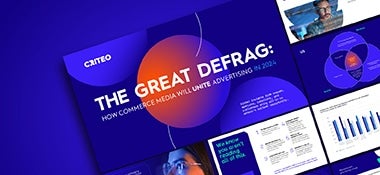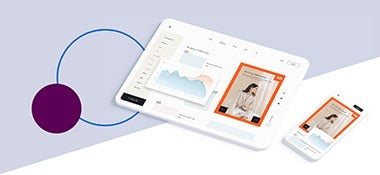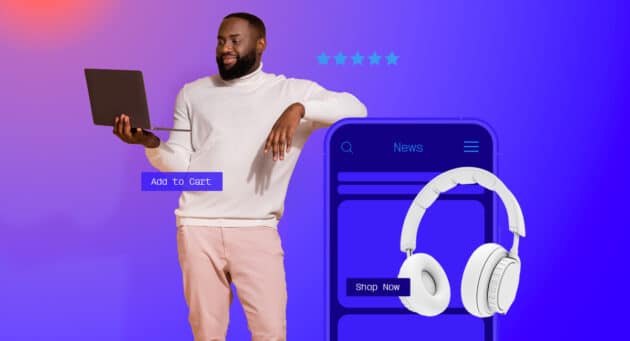The need for the internet has never been clearer than during this COVID-19 pandemic, as people rely on free and immediate access to news and information. However, the advertising that funds this ecosystem needs to provide better user experiences and more value to earn consumers’ trust.
Personalized advertising helps people find new brands they love and products they’ve been searching for — it even gives them the opportunity to engage with their communities or access free services such as weather apps.
And yet, it can be hard for consumers to see or understand the value that personalized advertising provides in exchange for their online behavior data. According to eMarketer in 2019, 83% of users worldwide say that they are concerned about their privacy online. We as an industry need to do more to educate and empower consumers to understand and control their preferred advertising experiences.
I believe advertising has to be better, so that consumers realize it’s a force for good in their lives. As our digital ecosystem matures, the industry needs to own up and collectively ensure all parties are getting a fair deal on the basis of these three guiding principles.
1. Users’ control of their data and ad experiences creates trust.
Regaining consumers’ trust is essential to re-balance the economic model of the open internet.
Trust comes from knowledge and control. There needs to be a clear link between consumers’ browsing history and advertising messages, as well as easy ways for users to manage their personal preferences and privacy. They should be able to easily start and pause advertising if they feel some of it is inappropriate, overwhelming, annoying, or if they simply don’t like them. On their end, advertisers should pledge to both adhere to their users’ stated preferences and to deliver the most value back to the consumer through advertising.
Providing transparency around how data is used makes it easier for consumers to understand the value they receive from the use of their data. Consumers should also feel they’re getting a fair deal, trading some information in return for free services. Personalized advertising needs to strike the right balance between the fundamental desire consumers have for privacy, the interests of advertisers who fund free online information and services, and the needs of publishers who rely on advertising to support their operations. This is the implicit deal — the “value exchange.”
2. Well-designed, user-personalized advertising benefits all players in the ecosystem.
Consumers, content creators and marketers all get positive results from personalized advertising. For instance, consumers get a truly convenient, customized advertising experience that adds value to their lives — as long as brands have established the right intimacy with their consumers and obtained their permission for effective one-to-one interactions with them. Criteo conducted a survey of more than 1,000 U.S. consumers last year and found that 48% said online ads help them discover new products. Advertising offers choice and diversity to consumers by opening their eyes to products and brands they wouldn’t have known about otherwise.
Publishers benefit from higher monetization, as user-centric advertising drives more effective and measurable results for them. Those results, in turn, attract more investment from brands and advertisers. Data from Google shows that without personalized advertising, publishers revenue drops by up to 62%, which would force many publishers to severely reduce the content they produce for their audience if personalized ads were to disappear.
And advertisers see the strongest return on ad spend with personalized advertising, as each customer is uniquely cared for and valued. A recent report from Forrester[1] about the future of advertising reminds us there will always be a place and need for user-personalized advertising: “Consumers will want more ad personalization after all, and the browsers will bend.”
If the industry needs to focus on less relevant personalization based on user groups, known as cohorts, or contextual data, then consumers may actually see advertising more as spam, since the ads won’t be for things that are truly personalized to their unique needs. Everybody is different and cohorts treat many people as the same. As an industry, we need to respect that consumers want, and are entitled to, both privacy and personalization. However, we are respectful of users’ choice, and for users who prefer cohort-based advertising, Criteo will aim at providing the best possible experience in privacy-friendly ways.
3. Browsers and devices should not control data portability – users should.
Since 2017, some browsers have taken choice and control away from users and now play a central role in determining how their data is managed. We don’t believe this is right as it effectively creates a compartmentalized internet. Browsers — and devices — should not control users’ data in a closed and opaque manner, especially when some of the largest and most powerful companies in the world own and operate the market-leading browsers and device operating systems.
Instead we believe browsers, identity providers and all participants in users’ digital activity should strive to offer users a unique and convenient way to empower them to tailor their experience to their privacy preferences. In short, we believe identification should be a collaborative industry effort, enabling users to gain transparency and control over what data is associated with their activity and with whom they are willing to share it. Yet, good intentions are not enough –there needs to be an independent certification and audit program. Unlike some browser manufacturers, we embrace and support industry-wide efforts, such as the Transparency & Control Framework (TCF), so that all ecosystem participants can contribute to making the internet even richer than it is today.
As mentioned, regulators are stepping in to help establish lasting industry standards around online identity and personalization. We think this is a welcome step towards finding a solution to personalized advertising that meets users’ expectations and benefits the entire ecosystem. Collaboration across all industry participants will help avoid pitfalls from previous standards initiatives because the solution won’t be coming from a single player.
Industry-wide standards will help restore balance to the value exchange and establish trust for all parties involved. We’re happy to be part of the online identity conversation, collaborating with other industry participants through the WFA, ANA, IAB, W3C and NAI forums to ensure that proposed solutions help benefit consumers, publishers and advertisers. It’s only by working together as an industry that we’ll be able to create a unified solution that restores the value exchange on the open internet.
No matter what the future of online identification looks like, we will offer advertisers the right message at the right time to the right person — and provide the best experience to consumers. We will continue to bring Criteo’s experience, scale, and technical depth to the ongoing discussions to help design the privacy-safe media buying modalities that marketers need for user-personalized advertising. This way, we can continue to drive value for consumers, publishers and advertisers alike in ways that makes advertising better and trusted by consumers.
[1] Forrester ; The Future Of Advertising Is Imminent Upheaval — And You’re Not Ready For It ; 7th April 2020 ; By Joanna O’Connell, Sarah Dawson with Brigitte Majewski, Luca Russo, Christine Turley; https://www.forrester.com/report/The+Future+Of+Advertising+Is+Imminent+Upheaval+And+Youre+Not+Ready+For+It/-/E-RES144160 (subscription required)















